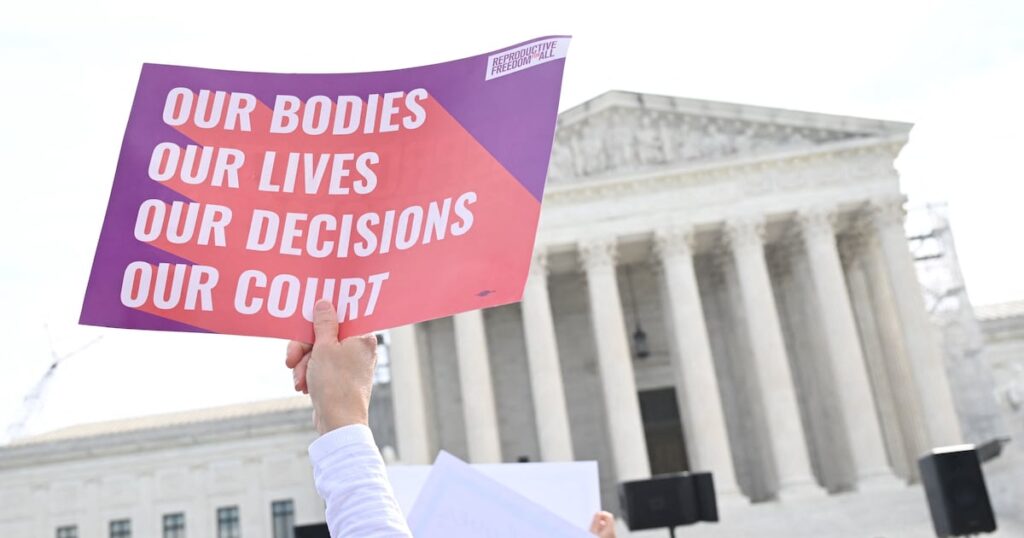The messy state of reproductive rights in the United States was highlighted this week when Republicans blocked a bill that would have protected in vitro fertilization (IVF) while the Supreme Court upheld protections for the drug used in most abortions, at least for now.
Reproductive rights have taken center stage ahead of the Nov. 5 presidential election, putting Republicans on the defensive two years after a conservative Supreme Court struck down a national right to abortion, leading to a wave of bans and restrictions at the state level.
The politically and culturally influential Southern Baptist Convention voted Wednesday to formally oppose in vitro fertilization, a widely used fertility treatment that has helped millions of people become parents.
About 2% of babies born in the United States are conceived through in vitro fertilization, but critics oppose the process, saying surplus frozen embryos are discarded.
Southern Baptists are seen as the vanguard of ultra-conservatism and evangelical thought in the United States and wield great influence within the Republican Party, so official opposition to IVF could be a precursor to legislative measures to ban the procedure.
Senate Republicans on Thursday nearly unanimously blocked a Democratic bill that would have protected access to in vitro fertilization, following efforts to crack down on the procedure at the state level.
The bill's lead sponsor, Democratic Sen. Tammy Duckworth, who has used IVF, blamed Republicans.
“As a mother who struggled with infertility for years, and as a parent who required IVF to have two beautiful daughters, all I can say to my Republican colleagues today is: how dare you do that,” Duckworth told reporters.
US President Joe Biden said it was “outrageous and unacceptable” for Republicans to “ignore women's rights to make decisions for themselves and their families.”

Donald Trump said in February that he “strongly supports the availability of IVF” and urged Alabama lawmakers to preserve access to the treatment after the Alabama Supreme Court ruled in February that three couples who lost frozen embryos in an accident at a storage facility can sue fertility clinics and hospitals for the wrongful death of a minor.
Even far-right conservatives like Ted Cruz, who voted against the Democratic bill this week, have introduced their own IVF bills and have downplayed Democratic accusations that they are trying to ban the procedure.
“No one is trying to ban IVF. Not a single senator. I voted against this bill because it goes far beyond IVF. This bill is designed as a back door to federalize abortion and other issues,” Cruz said in a statement.
Abortion pills
Within hours of the Senate vote on IVF, the conservative-led Supreme Court unanimously blocked a challenge to federal approval of the drug mifepristone, which is used in 60 percent of abortions.
It was a rare unanimous victory for abortion rights by the court, which in 2022 overturned the 1973 Roe v. Wade decision that upheld abortion rights at the federal level.
Mifepristone is a medication that blocks progesterone, a hormone needed to continue a pregnancy. It is used in combination with another medication called misoprostol to end a pregnancy up to 10 weeks into the pregnancy (up to 70 days after the first day of the last menstrual period).

Justice Brett Kavanaugh, a conservative Supreme Court appointee to the court by President Trump, noted in a court opinion that the anti-abortion doctors who brought the case do not prescribe the drug in their own practices.
“Rather, plaintiffs want the FDA to make mifepristone more difficult for other physicians to prescribe and more difficult for pregnant women to obtain,” Kavanaugh wrote.
Under the U.S. Constitution, a group's “desire to make it harder for others to obtain a particular drug” does not give it standing to sue, he added.
But Democrats said this was not a sign they would ease up on the fight to restore federal protections for abortion, and the court wrote that the issue “may be subject to the political or democratic process,” suggesting that future legislation banning the abortion drug could be attempted.
According to the Center for Reproductive Rights, access to the procedure “is at risk of being severely restricted or banned” in 26 states and three territories following the overturning of Roe v. Wade.
“Nearly half of the states are likely to either enact the most restrictive new laws possible or seek to enforce current unconstitutional abortion bans,” the center said.
Updated: June 14, 2024 4:48 PM


